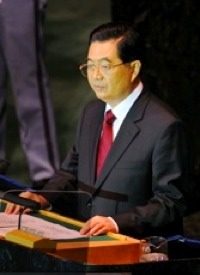
As the upcoming United Nations Climate Change Conference looms nearer, UN Secretary-General Ban Ki-moon is stepping up the pressure for drastic action in Copenhagen, and the United States and China appear poised to help lead the way.
The Summit on Climate Change met in New York to prepare for December’s Climate Change Conference in Copenhagen. Ban Ki-moon has been adamant concerning the need for radical action, and he kept up the pressure on Tuesday. According to the summit’s official website:
“Failure to reach broad agreement in Copenhagen would be morally inexcusable, economically short-sighted and politically unwise,” the Secretary-General said in his opening address. “Now is the moment to act in common cause.”
"There is little time left. The opportunity and responsibility to avoid catastrophic climate change is in your hands," Mr. Ban said, closing the day-long Summit on Climate Change.
One might argue that the only catastrophic changes looming are those proposed as part of the “cure” for climate change. With the world already reeling from profound economic troubles, schemes for redistributing hundreds of billions of dollars from the industrialized nations to the third world threaten the livelihood of countless numbers of people around the world, while the possibility of national, and international, “carbon-credit” schemes could undermine the capacity of industry to provide the goods and energy necessary to maintain the modern way of life.
Not that such concerns register on the radar of the environmental alarmists.
The words of President Obama and China’s communist dictator Hu Jintao have increased the likelihood that work on a Copenhagen Protocol — superceding that of Kyoto— will continue. According to the Associated Press report on this week’s summit in New York:
President Barack Obama and Chinese President Hu Jintao each vowed urgent action Tuesday to cool an overheating planet, even as prospects dimmed for a full treaty by the end of the year.
The world’s two biggest greenhouse-gas polluting nations were the focus at the U.N.’s unprecedented daylong climate change summit, which drew more than 50 presidents and 35 prime ministers, along with many environment ministers and at least one prince.
Failure to reach a new international pact on climate change "would be morally inexcusable, economically shortsighted and politically unwise," Ban warned. "The science demands it. The world economy needs it."
At the end of the summit, however, Ban and Danish Prime Minister Lars Loekke Rasmussen, who will host the treaty talks, said they were encouraged at the prospects. "This feeling of political momentum — that was very strong," said Loekke Rasmussen.
Zammit Cutajar, the chairman of the committee planning for the Copenhagen conference, had previously speculated: "The New York summit … could get the big political bosses to tell their guys ‘start moving.’" Now, the two biggest “political bosses,” Obama and Hu, have sent precisely such a signal. The question for Obama is whether his rapidly failing presidency has the political moxie to back up his words. The AP story notes,
Much attention was fixed on Obama’s first U.N. speech, in which he pledged the United States is "determined to act."
"The threat from climate change is serious, it is urgent, and it is growing," Obama said, after receiving loud applause. "And the time we have to reverse this tide is running out."
But while Obama campaigned for the presidency vowing to push through stringent cuts in U.S. emissions, he has run up against stiff resistance among Republicans, and the Senate most likely won’t have written climate legislation until after the Copenhagen meeting.
By comparison, Hu runs a command economy and was unencumbered by political opposition. He outlined an ambitious program that included plans to plant enough forest to cover about 150,000 square miles — an area the size of Montana — and generate 15 percent of its energy needs from renewable sources within a decade.
He said the communist nation would also take steps to improve energy efficiency and reduce "by a notable margin" its growth rate of carbon pollution as measured against economic growth — though he did not give any specific numerical targets.
The speeches, and political realities, of Obama and Hu still highlight the hope that remains for what was once called "the free world." The promises dolled out by any communist dictator are usually not worth the paper on which they are printed; President Reagan’s motto for dealing with the Soviets, “Trust, but verify,” is sound, but more often invoked than practiced. Communist braggadocio about bold schemes to save the Earth can only be seen as unverified rhetoric — at best.
As the AP notes, President Obama still finds himself constrained by the rule of law and the balance of powers that the framers of the U.S. Constitution established, and the president and his teleprompter do not trump the law. When the applause dies away, Obama still faces an American people who are increasingly skeptical of the spin coming from every corner of Washington, and he must cope with the reality of a Congress that must still, at the end of the day, answer to the electorate for their actions.
Communist schemes to remake the world according to their whims — whether one considers the scandalous condition of the Yellow and Yangtze Rivers, or Hu’s sudden penchant for forestry — are usually ultimately unified by ending in failure, disastrous or otherwise.
Addressing the world’s actual environmental problems is not a matter for global elitists who are often deeply mired in agendas that have very little to do with anything so noble as "saving the world." Given the breathtaking scope of most of the proposed “solutions” to a thus-far essentially hypothetical problem of climate change, the American people have a right to understand the problem and the implications of proposed solutions before the nation is committed to a course of action that may soon be seen to have been reckless.
Photo of Hu Jintao: AP Images



